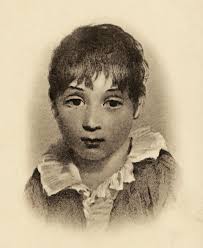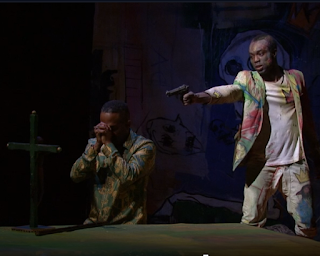Changing Interpretations Over Time: Hartley Coleridge
From father to son.
Hartley Coleridge (1796-1849) is the eldest son of Samuel Taylor Coleridge, who followed in his father's footsteps by becoming a poet (though was also a teacher), and likewise wrote about Hamlet. It is generally accepted that he was not as successful in literary terms, or in life more generally, as his father. Perhaps burdened by the expectation of his famous name, and in the shadow of his father's genius, he is variously described as 'wayward', 'a failure'. 'melancholic' and 'solitary'.
HARTLEY COLERIDGE: from Blackwood's Edinburgh Magazine, November 1828
Let us, for a moment, put Shakespeare out of the question, and consider Hamlet as a real person, a recently deceased acquaintance. In real life, it is no unusual thing to meet with characters every whit as obscure as that of the Prince of Denmark; men seemingly accomplished for the greatest actions, clear in thought, and dauntless in deed, still meditating mighty works, and urged by all the motives and occasions to the performance, - whose existence is nevertheless an unperforming dream; men of noblest, warmest affections, who are perpetually wringing the hearts of those whom they love best; whose sense of rectitude is strong and wise enough to inform and govern a world, while their acts are the hapless issues of casualty and passion, and scarce to themselves appear their own.
We cannot conclude that all such have seen ghosts; though the existence of ghost-seers is as certain, as that of ghosts is problematical. But they will generally be found, either by a course of study and meditation too remote from the art and practice of life, - by designs too pure and perfect to be executed in earthly materials, - or from imperfect glimpses of an intuition beyond the defined limits of communicable knowledge, to have severed themselves from the common society of human feelings and opinions, and become as it were ghosts in the body.
Such a man is Hamlet; an habitual dweller with his own thoughts, - preferring the possible to the real, - refining on the ideal forms of things, till the things themselves become dim in his sight, and all the common doings and sufferings, the obligations and engagements of the world, a weary task, stale and unprofitable. By natural temperament he is more a thinker than a doer. His abstract intellect is an overbalance for his active impulses. The death of his father, his mother's marriage, and his own exclusion from the succession, - sorrow for one parent, shame for another, and resentment for himself, - tend still further to confirm and darken a disposition, which the light heart of happy youth had hitherto counteracted. Sorrow contracts around his soul, and shuts it out from cheerful light, and wholesome air.
What are the key ideas in Hartley Coleridge's argument?
Summarise them in your own words. Might any still have resonance today? Why/not? Give examples from Hamlet to support your ideas.
How does this compare with some of the perspectives that we have read previously?
Is there a memorable, standout phrase?
Hartley Coleridge (1796-1849) is the eldest son of Samuel Taylor Coleridge, who followed in his father's footsteps by becoming a poet (though was also a teacher), and likewise wrote about Hamlet. It is generally accepted that he was not as successful in literary terms, or in life more generally, as his father. Perhaps burdened by the expectation of his famous name, and in the shadow of his father's genius, he is variously described as 'wayward', 'a failure'. 'melancholic' and 'solitary'.
HARTLEY COLERIDGE: from Blackwood's Edinburgh Magazine, November 1828
Let us, for a moment, put Shakespeare out of the question, and consider Hamlet as a real person, a recently deceased acquaintance. In real life, it is no unusual thing to meet with characters every whit as obscure as that of the Prince of Denmark; men seemingly accomplished for the greatest actions, clear in thought, and dauntless in deed, still meditating mighty works, and urged by all the motives and occasions to the performance, - whose existence is nevertheless an unperforming dream; men of noblest, warmest affections, who are perpetually wringing the hearts of those whom they love best; whose sense of rectitude is strong and wise enough to inform and govern a world, while their acts are the hapless issues of casualty and passion, and scarce to themselves appear their own.
We cannot conclude that all such have seen ghosts; though the existence of ghost-seers is as certain, as that of ghosts is problematical. But they will generally be found, either by a course of study and meditation too remote from the art and practice of life, - by designs too pure and perfect to be executed in earthly materials, - or from imperfect glimpses of an intuition beyond the defined limits of communicable knowledge, to have severed themselves from the common society of human feelings and opinions, and become as it were ghosts in the body.
Such a man is Hamlet; an habitual dweller with his own thoughts, - preferring the possible to the real, - refining on the ideal forms of things, till the things themselves become dim in his sight, and all the common doings and sufferings, the obligations and engagements of the world, a weary task, stale and unprofitable. By natural temperament he is more a thinker than a doer. His abstract intellect is an overbalance for his active impulses. The death of his father, his mother's marriage, and his own exclusion from the succession, - sorrow for one parent, shame for another, and resentment for himself, - tend still further to confirm and darken a disposition, which the light heart of happy youth had hitherto counteracted. Sorrow contracts around his soul, and shuts it out from cheerful light, and wholesome air.
What are the key ideas in Hartley Coleridge's argument?
Summarise them in your own words. Might any still have resonance today? Why/not? Give examples from Hamlet to support your ideas.
How does this compare with some of the perspectives that we have read previously?
Is there a memorable, standout phrase?




Comments
Post a Comment